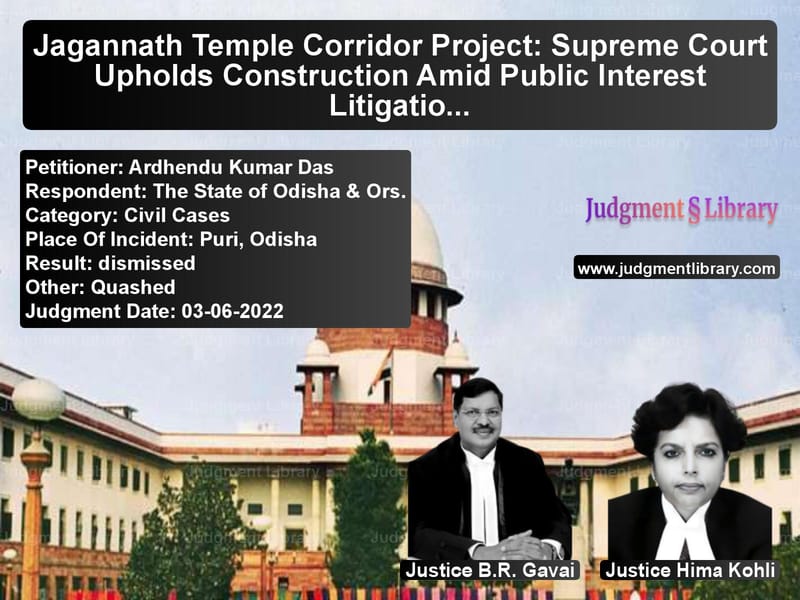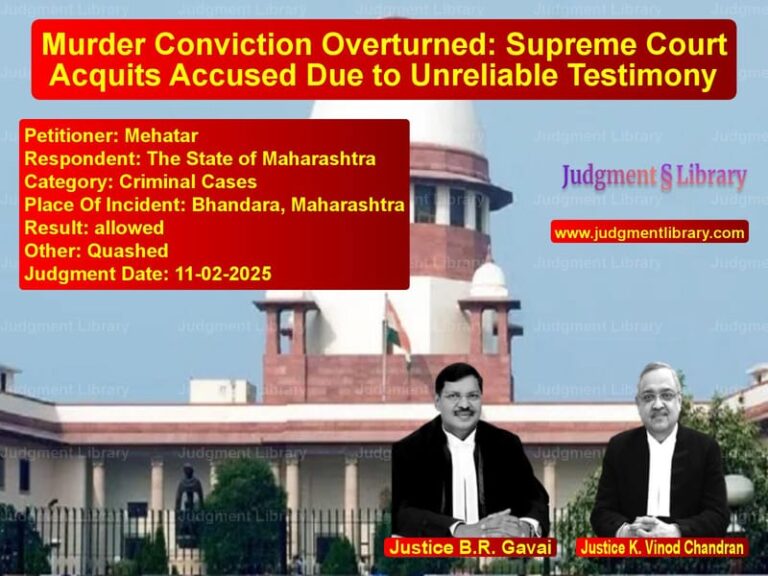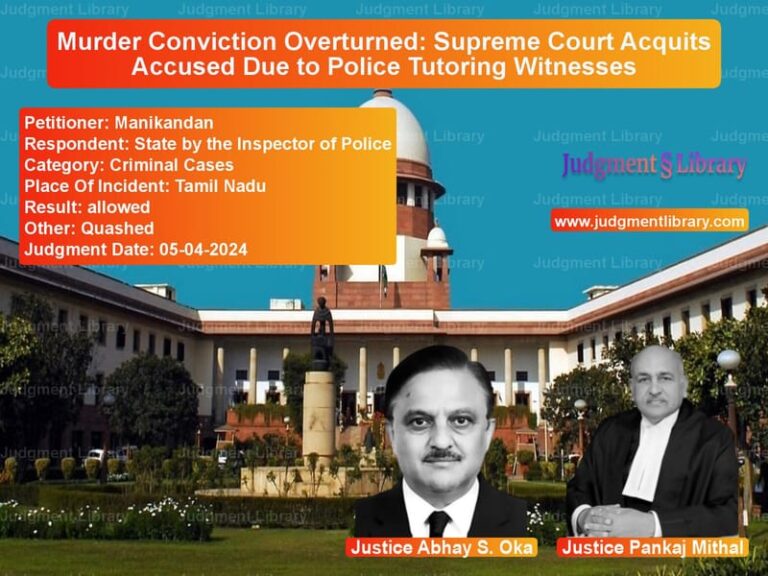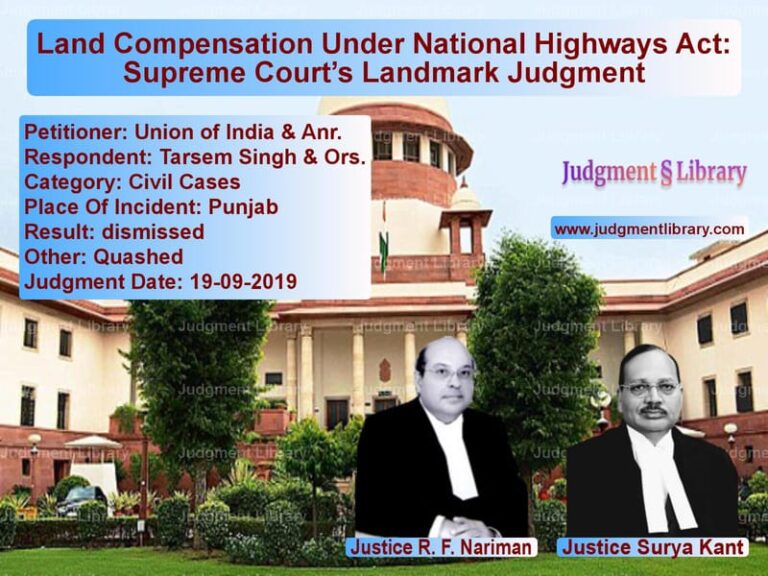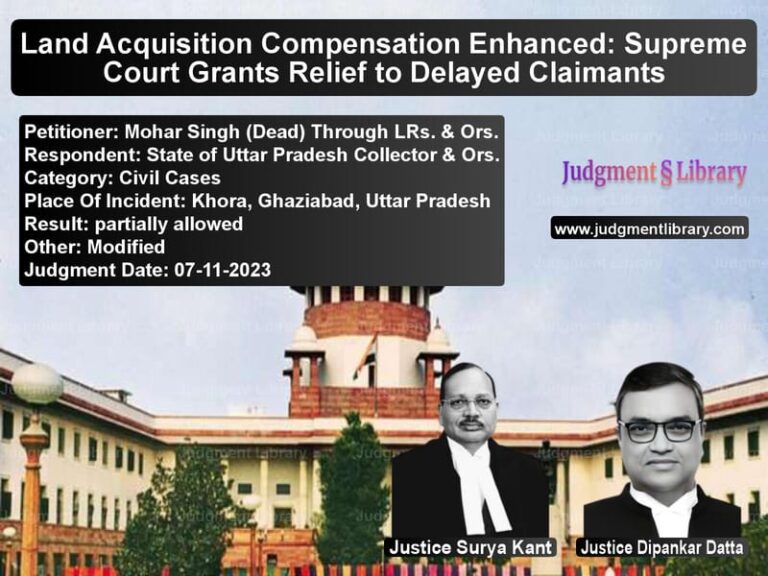Jagannath Temple Corridor Project: Supreme Court Upholds Construction Amid Public Interest Litigation
The Supreme Court recently ruled on the controversial Jagannath Temple corridor project in the case of Ardhendu Kumar Das v. The State of Odisha & Ors.. The dispute arose over construction activities near the Shree Jagannath Temple in Puri, Odisha. The petitioners alleged that the project violated heritage and environmental laws, while the state government argued that it was essential for improving public facilities.
The Supreme Court dismissed the Public Interest Litigation (PIL) and imposed a fine of Rs. 1,00,000 on each petitioner for filing a frivolous case. The Court ruled that the construction adhered to previous directives aimed at enhancing public amenities and that there was no statutory prohibition against it.
Background of the Case
The case involved a PIL challenging construction activities near the Shree Jagannath Temple, a UNESCO World Heritage site. The petitioners claimed that the development violated the Ancient Monuments and Archaeological Sites and Remains Act, 1958, and posed risks to the temple’s structural integrity.
The Odisha government, in contrast, defended the project, stating that it was aimed at improving amenities for the millions of devotees who visit the temple every year. The dispute escalated when the petitioners sought an injunction against further construction.
The legal proceedings included:
- April 8, 2022: PIL filed in the Orissa High Court.
- May 9, 2022: The High Court declined to issue an interim stay on construction.
- June 3, 2022: Supreme Court dismissed the PIL and imposed fines on the petitioners.
Petitioner’s Arguments
The petitioners contended that:
- The construction violated Section 20A of the Ancient Monuments and Archaeological Sites and Remains Act, 1958, which prohibits new construction within 100 meters of a protected monument.
- Digging near the temple could threaten its structural stability.
- The project did not receive the necessary approvals from the Archaeological Survey of India (ASI).
- Mass excavation near the temple posed an environmental hazard.
Respondent’s Arguments
The Odisha government argued that:
- The project was undertaken in compliance with previous Supreme Court directives to improve amenities for devotees.
- Construction was being carried out only in pre-existing areas and did not involve new structures in prohibited zones.
- The ASI had no objections to the work being carried out, as long as it adhered to guidelines.
- The National Monuments Authority (NMA) had issued a No Objection Certificate (NOC) for the project.
Key Observations of the Supreme Court
The Supreme Court ruled in favor of the Odisha government, making the following observations:
“The activities undertaken by the State are completely in tune with the directions issued by the three-judge bench of this Court in the case of Mrinalini Padhi. They are necessary in the larger public interest, and there is no prohibition in the statute for doing so.”
The Court emphasized:
- The construction was legal as it complied with existing regulations and previous judicial orders.
- Facilities like public toilets, cloakrooms, and queue shelters were essential for the comfort of pilgrims.
- There was no evidence to suggest that the construction posed any threat to the temple’s stability.
- The PIL was an abuse of judicial process and aimed at stalling a project that benefited the public.
Final Judgment and Directions
The Supreme Court issued the following rulings:
- The PIL was dismissed with a fine of Rs. 1,00,000 on each petitioner.
- The Odisha government could proceed with the construction as per approved plans.
- The ASI and NMA were directed to monitor the project to ensure compliance.
- The Court warned against filing frivolous PILs that hinder development.
Conclusion
The Supreme Court’s ruling reaffirmed that legitimate development projects should not be stalled due to baseless litigation. While environmental and heritage concerns are important, they should not obstruct public infrastructure improvements without valid reasons.
This case sets an important precedent by emphasizing that PILs should serve genuine public interest and not be used as a tool to delay legally sanctioned projects.
Petitioner Name: Ardhendu Kumar Das.Respondent Name: The State of Odisha & Ors..Judgment By: Justice B.R. Gavai, Justice Hima Kohli.Place Of Incident: Puri, Odisha.Judgment Date: 03-06-2022.
Don’t miss out on the full details! Download the complete judgment in PDF format below and gain valuable insights instantly!
Download Judgment: ardhendu-kumar-das-vs-the-state-of-odisha-supreme-court-of-india-judgment-dated-03-06-2022.pdf
Directly Download Judgment: Directly download this Judgment
See all petitions in Property Disputes
See all petitions in Environmental Cases
See all petitions in Judgment by B R Gavai
See all petitions in Judgment by Hima Kohli
See all petitions in dismissed
See all petitions in Quashed
See all petitions in supreme court of India judgments June 2022
See all petitions in 2022 judgments
See all posts in Civil Cases Category
See all allowed petitions in Civil Cases Category
See all Dismissed petitions in Civil Cases Category
See all partially allowed petitions in Civil Cases Category

